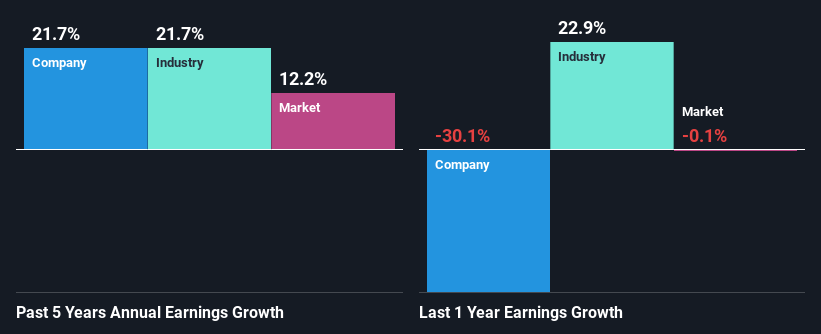Could The Market Be Wrong About Reckitt Benckiser Group plc (LON:RKT) Given Its Attractive Financial Prospects?
It is hard to get excited after looking at Reckitt Benckiser Group's (LON:RKT) recent performance, when its stock has declined 24% over the past three months. However, stock prices are usually driven by a company’s financial performance over the long term, which in this case looks quite promising. Particularly, we will be paying attention to Reckitt Benckiser Group's ROE today.
Return on equity or ROE is an important factor to be considered by a shareholder because it tells them how effectively their capital is being reinvested. In short, ROE shows the profit each dollar generates with respect to its shareholder investments.
View our latest analysis for Reckitt Benckiser Group
How To Calculate Return On Equity?
Return on equity can be calculated by using the formula:
Return on Equity = Net Profit (from continuing operations) ÷ Shareholders' Equity
So, based on the above formula, the ROE for Reckitt Benckiser Group is:
19% = UK£1.6b ÷ UK£8.5b (Based on the trailing twelve months to December 2023).
The 'return' is the amount earned after tax over the last twelve months. That means that for every £1 worth of shareholders' equity, the company generated £0.19 in profit.
Why Is ROE Important For Earnings Growth?
We have already established that ROE serves as an efficient profit-generating gauge for a company's future earnings. Depending on how much of these profits the company reinvests or "retains", and how effectively it does so, we are then able to assess a company’s earnings growth potential. Assuming all else is equal, companies that have both a higher return on equity and higher profit retention are usually the ones that have a higher growth rate when compared to companies that don't have the same features.
Reckitt Benckiser Group's Earnings Growth And 19% ROE
To start with, Reckitt Benckiser Group's ROE looks acceptable. Further, the company's ROE compares quite favorably to the industry average of 11%. This certainly adds some context to Reckitt Benckiser Group's exceptional 22% net income growth seen over the past five years. We reckon that there could also be other factors at play here. Such as - high earnings retention or an efficient management in place.
Next, on comparing Reckitt Benckiser Group's net income growth with the industry, we found that the company's reported growth is similar to the industry average growth rate of 22% over the last few years.
Earnings growth is a huge factor in stock valuation. It’s important for an investor to know whether the market has priced in the company's expected earnings growth (or decline). Doing so will help them establish if the stock's future looks promising or ominous. What is RKT worth today? The intrinsic value infographic in our free research report helps visualize whether RKT is currently mispriced by the market.
Is Reckitt Benckiser Group Efficiently Re-investing Its Profits?
Reckitt Benckiser Group's significant three-year median payout ratio of 56% (where it is retaining only 44% of its income) suggests that the company has been able to achieve a high growth in earnings despite returning most of its income to shareholders.
Moreover, Reckitt Benckiser Group is determined to keep sharing its profits with shareholders which we infer from its long history of paying a dividend for at least ten years. Based on the latest analysts' estimates, we found that the company's future payout ratio over the next three years is expected to hold steady at 58%. Regardless, the future ROE for Reckitt Benckiser Group is predicted to rise to 30% despite there being not much change expected in its payout ratio.
Conclusion
Overall, we are quite pleased with Reckitt Benckiser Group's performance. In particular, its high ROE is quite noteworthy and also the probable explanation behind its considerable earnings growth. Yet, the company is retaining a small portion of its profits. Which means that the company has been able to grow its earnings in spite of it, so that's not too bad. With that said, the latest industry analyst forecasts reveal that the company's earnings growth is expected to slow down. To know more about the company's future earnings growth forecasts take a look at this free report on analyst forecasts for the company to find out more.
Have feedback on this article? Concerned about the content? Get in touch with us directly. Alternatively, email editorial-team (at) simplywallst.com.
This article by Simply Wall St is general in nature. We provide commentary based on historical data and analyst forecasts only using an unbiased methodology and our articles are not intended to be financial advice. It does not constitute a recommendation to buy or sell any stock, and does not take account of your objectives, or your financial situation. We aim to bring you long-term focused analysis driven by fundamental data. Note that our analysis may not factor in the latest price-sensitive company announcements or qualitative material. Simply Wall St has no position in any stocks mentioned.

 Yahoo Finance
Yahoo Finance 
